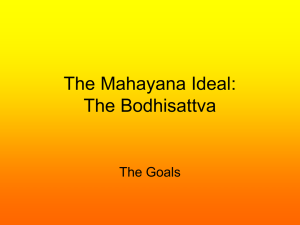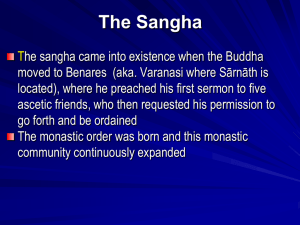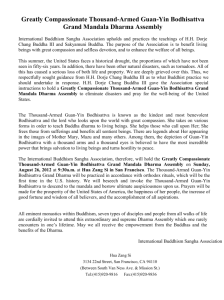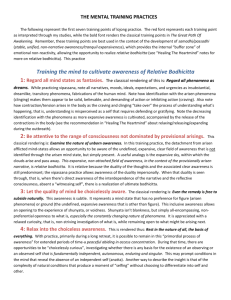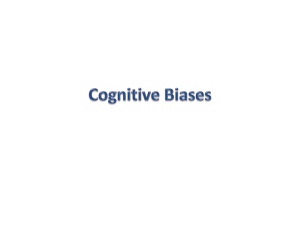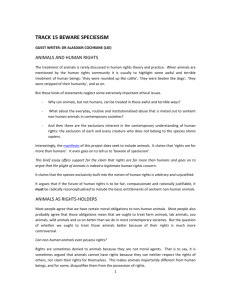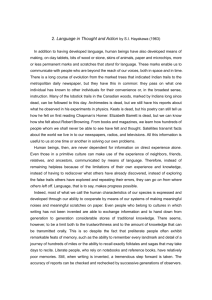Lesson_6 - Amitabha Buddhist Centre
advertisement
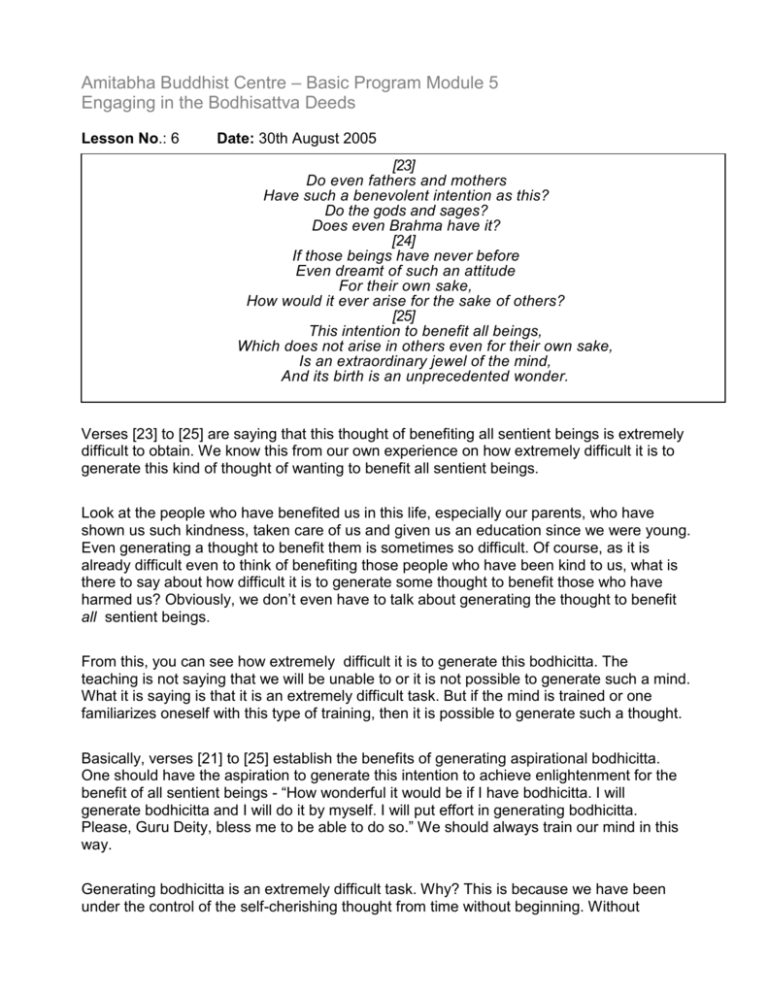
Amitabha Buddhist Centre – Basic Program Module 5 Engaging in the Bodhisattva Deeds Lesson No.: 6 Date: 30th August 2005 [23] Do even fathers and mothers Have such a benevolent intention as this? Do the gods and sages? Does even Brahma have it? [24] If those beings have never before Even dreamt of such an attitude For their own sake, How would it ever arise for the sake of others? [25] This intention to benefit all beings, Which does not arise in others even for their own sake, Is an extraordinary jewel of the mind, And its birth is an unprecedented wonder. Verses [23] to [25] are saying that this thought of benefiting all sentient beings is extremely difficult to obtain. We know this from our own experience on how extremely difficult it is to generate this kind of thought of wanting to benefit all sentient beings. Look at the people who have benefited us in this life, especially our parents, who have shown us such kindness, taken care of us and given us an education since we were young. Even generating a thought to benefit them is sometimes so difficult. Of course, as it is already difficult even to think of benefiting those people who have been kind to us, what is there to say about how difficult it is to generate some thought to benefit those who have harmed us? Obviously, we don’t even have to talk about generating the thought to benefit all sentient beings. From this, you can see how extremely difficult it is to generate this bodhicitta. The teaching is not saying that we will be unable to or it is not possible to generate such a mind. What it is saying is that it is an extremely difficult task. But if the mind is trained or one familiarizes oneself with this type of training, then it is possible to generate such a thought. Basically, verses [21] to [25] establish the benefits of generating aspirational bodhicitta. One should have the aspiration to generate this intention to achieve enlightenment for the benefit of all sentient beings - “How wonderful it would be if I have bodhicitta. I will generate bodhicitta and I will do it by myself. I will put effort in generating bodhicitta. Please, Guru Deity, bless me to be able to do so.” We should always train our mind in this way. Generating bodhicitta is an extremely difficult task. Why? This is because we have been under the control of the self-cherishing thought from time without beginning. Without Amitabha Buddhist Centre – Basic Program Module 5 Engaging in the Bodhisattva Deeds getting rid of the self-cherishing thought, there is no way for us to generate bodhicitta. Of course, bodhicitta is the supreme and most powerful antidote to self-cherishing thought. This chapter [chapter 1] talks about the benefits of bodhicitta. We should understand the benefits of bodhicitta, know its extraordinary qualities. By understanding the qualities of bodhicitta, one will naturally develop an aspiration to generate it in our own mind. So it is important always to aspire and to pray, “How wonderful it would be if I were to generate bodhicitta, I will generate bodhicitta”. It is important to pray in such a way. If we generate bodhicitta in our own mental continuum, we will attain happiness for ourselves and others will be happy as well. This goes without saying. 2) The validity of obtaining benefits from engaging bodhicitta a) The actual [benefits of engaging bodhicitta] b) Establishing the validity through reason c) Dispelling qualms b) Establishing the validity through reason [ 27] If merely a benevolent intention Excels veneration of the Buddhas, Then what need to mention striving to make All beings, without exception, happy? This “benevolent intention” refers to the aspirational bodhicitta. Just having this intention to achieve enlightenment for the benefit of all sentient beings and if one were to produce such a thought, the merit that one will accumulate will exceed the merit that one will accumulate by making countless offering to billions of Buddhas. This is as quoted in the King of Concentrations Sutra, “The merit that one accumulates from just generating this bodhicitta exceeds making countless offering everyday to billions and billions of Buddhas.” Just by generating this mere intention to achieve enlightenment for the benefit of sentient beings would bring forth such an inconceivable amount of merit. Therefore it goes without saying that for someone who puts a lot of effort into engaging in the bodhisattva’s deeds on the basis of having generated this bodhicitta, obviously the merit would be much greater. In short, the merit that is derived from engaged bodhicitta is far greater than the merit that one accumulates just by having aspirational bodhicitta. The difference between these two is due to the practice of engaging in the bodhisattva deeds. The mere generation of aspirational bodhicitta is not conjoined with the practice of the bodhisattva deeds whereas engaged bodhicitta is the generation of bodhicitta conjoined with the practice of the bodhisattva deeds. Here one is actually putting effort into doing something to move towards the goal of enlightenment. Obviously the merit that comes from engaged bodhicitta is far more superior and greater. Lesson 6 Page 2 of 11 Amitabha Buddhist Centre – Basic Program Module 5 Engaging in the Bodhisattva Deeds c) Dispelling qualms [ 28 ] Although wishing to be rid of misery, They run towards misery itself. Although wishing to have happiness, Like an enemy they ignorantly destroy it [29] For those who are deprived of happiness And burdened with many sorrows, It satisfies them with all joys, Dispels all suffering, [ 30 ] And clears away confusion. Where is there a comparable virtue? Where is there even such a friend? Where is there merit similar to this? Verses [28] to [30] are under the outline “Dispelling qualms” – dispelling the qualms regarding the benefits of engaged bodhicitta. The last two lines in verse [27] “Then what need to mention striving to make, All beings, without exception, happy?” is saying that because we are directly engaging in the practices to fulfil one’s aspiration of becoming enlightenment, the merit from engaged bodhicitta is greater than that coming from aspirational bodhicitta. However, there some doubts or qualms that needs to be clarified. Qualm: When we have engaged bodhicitta, we are actually engaged in doing whatever is necessary to fulfil the welfare of others. Somebody might raise this objection saying “Aren’t we all expert in achieving our own happiness? Aren’t we expert in getting rid of suffering for ourselves? If that’s the case, since we are expert in doing that, why do we need to work to make others happy? Why do we need to work towards eliminating the suffering of others?” In other words, why do we need Buddhas? Why do we need bodhisattvas? Answer: The answer is in verse [28]. There is a need to benefit others. There is a need to have engaged bodhicitta to benefit others. Why? It is true that all sentient beings want happiness and do not want suffering. Motivated by the desire to avoid suffering, they do whatever is necessary to achieve their goal of getting happiness and avoiding suffering. But because their minds are clouded by ignorance, especially the ignorance of the law of cause and effect, even though they want happiness and do not want suffering, they engage in wrong actions in order to achieve their goal. Lesson 6 Page 3 of 11 Amitabha Buddhist Centre – Basic Program Module 5 Engaging in the Bodhisattva Deeds Although sentient beings have the wish of wanting to be happy and to avoid suffering, they engage in unskillful or mistaken methods to achieve their goal. For example, when some people are tormented by the suffering of hunger and thirst, to remove this type of suffering, they might engage in killing another sentient being. In order to satisfy one’s desires, one will steal or engage in sexual misconduct. In short, sentient beings engage in the ten nonvirtuous actions. The situation of sentient beings is likened to a butterfly that, attracted by the heat of the butter lamp, flies towards it and gets burnt by the flame. Similarly, sentient beings want to be happy but engage in mistaken actions. Sentient beings do not like suffering yet their minds are obscured by the ignorance that prevents them from seeing the causes of their sufferings. Sentient beings do not like suffering, yet they spontaneously run after the causes of suffering and engage in the causes of suffering. All sentient beings would like to attain higher rebirths as humans and gods and may even have the intention to attain liberation from all suffering. Although they have such an intention or motivation, because their minds are clouded by the ignorance regarding what is to be abandoned and what is to be cultivated to achieve their goal, because of this ignorance, they mistakenly abandon the causes of the happiness that they are looking for and engage in the causes that lead them to suffering. As the text says, the way we strive to achieve our own happiness, whatever methods or approaches we take, it cannot even compare to the way the bodhisattvas work in order to achieve the welfare of others. Basically, we are comparing our abilities to work for our own happiness and the ability of the bodhisattvas to work for the benefit of other sentient beings. Although we are working for our own happiness, we are unable to achieve it. Whereas the bodhisattvas who are working only for others, they are able to give us the happiness that we are looking for. The bodhisattvas possess bodhicitta in their mind and have the intention to work for the benefit of others to eliminate suffering and to achieve happiness for others. They are able to engage in activities to fulfil that goal. Bodhisattvas are able to do things that we are unable to do. Compared to bodhisattvas, we are sentient beings with our minds clouded by ignorance of what is to be abandoned and what is to be cultivated. We do not know how to cultivate the causes of happiness and also do not know the causes of suffering. Comparing our selves to bodhisattvas, bodhisattvas are beings who possess bodhicitta and are able to engage in activities that actually bring benefit to others. Bodhisattvas, motivated by loving kindness and compassion, are able to satisfy the bodies and minds of sentient beings and enable them to achieve higher rebirths as humans and gods. Bodhisattvas are motivated by compassion to help sentient beings stuck in samsara, to cut the causes of cyclic existence. With great wisdom, the bodhisattvas are able to show sentient beings, correctly, what is to be abandoned - especially the ignorance relating to Lesson 6 Page 4 of 11 Amitabha Buddhist Centre – Basic Program Module 5 Engaging in the Bodhisattva Deeds the law of cause and effect - and what is to be cultivated. In short, bodhisattvas are able to bestow on sentient beings, who are deprived of happiness, the happiness that they are looking for. Bodhisattvas are also able to eliminate the suffering of sentient beings. Bodhisattvas are also able to eliminate the ignorance of sentient beings. What is there that can compare to such a benevolent intention or this bodhicitta? As in verse 30 “Where is there a comparable virtue?” The bodhisattvas are able to give happiness, eliminate suffering and the ignorance of sentient beings because they possess bodhicitta. When we are comparing bodhicitta to other kinds of virtue, there is no other virtue that can be compared with bodhicitta. There is no other virtue that has the same benefit as bodhicitta. Bodhicitta is also able to stop all harms and it is something that enables us to obtain all the benefits. “Where is there even such a virtuous friend?” There is none that can compare to bodhicitta. “Where is there merit similar to this?” Bodhicitta is able to produce in the mind a special kind of joy in the short run and in the long run. There is no merit that can compare to bodhicitta. In essence, we should strive to generate bodhicitta and maintain that bodhicitta which has been generated. Basically, we need to generate bodhicitta. Of all the kinds of virtue that one can find, bodhicitta is supreme. When we talk about virtuous friends, bodhicitta is supreme. When we look into the kinds of merit, especially in terms of completing the accumulation of merit, bodhicitta is supreme. D. Praising the person who cultivates bodhicitta a. They are worthy of praise because even though they have not been entrusted [with a specific task], by drawing upon great compassion, they act to assist others b. If someone who accomplishes the slightest of benefits is worthy of compliments, someone who accomplishes all benefit and bliss is worthy of the highest praise c. They are worthy of praise because they are the supreme field 1) The reasons it is unreasonable to belittle a bodhisattva in even the slightest way 2) The reasons it is reasonable to cultivate faith 3) Thus, its is befitting to pay homage to them and go for refuge a. They are worthy of praise because even though they have not been entrusted [with a specific task], by drawing upon great compassion, they act to assist others Lesson 6 Page 5 of 11 Amitabha Buddhist Centre – Basic Program Module 5 Engaging in the Bodhisattva Deeds [31] If whoever repays a kind deed Is worthy of some praise, Then what need to mention the Bodhisattvas Who do good without it being asked of them? In this world, especially when we are down with suffering and then somebody comes along to help us. Later, when we see the person again, we will remember that this person had helped us before. This person is usually being praised as a good person. What about someone who has great compassion and engages in activities to benefit sentient beings, without the hope of the favour being returned or receiving any benefit from such actions? Or someone who looks at sentient beings without any bias? Such a person only works to benefit all sentient beings and all the activities of such a bodhisattva is only virtue. Obviously then such a person is worthy of praise by all humans and gods. This verse is saying that if someone who benefits us in this life is worthy of praise and can be considered a good human being, it goes without saying that bodhisattvas who are always working for the benefit of all sentient beings with the mind of great compassion and unconditionally, without any bias or hope of anything in return, such bodhisattvas are definitely objects worthy of praise by all humans and gods. Therefore, bodhisattvas are suitable objects of homage and of prostration. Bodhisattvas help others without being asked or being requested. When they help others, they don’t ask anything in return. Why are they working for sentient beings? This is because they are driven by great compassion. Of course, someone who accomplishes something successful in this world is an object of praise. With reference to the bodhisattvas, it goes without saying that someone who accomplishes all benefit and bliss are worthy of the highest praise as seen in verses [32] & [33] b. If someone who accomplishes the slightest of benefits is worthy of compliments, someone who accomplishes all benefit and bliss is worthy of the highest praise [ 32 ] The world honors as virtuous One who sometimes gives a little, plain food Disrespectfully to a few beings, Which satisfies them for only half a day. [ 33 ] What need be said then of one Who eternally bestows the peerless bliss of the Sugatas Upon limitless numbers of beings, Thereby fulfilling all their hopes? Lesson 6 Page 6 of 11 Amitabha Buddhist Centre – Basic Program Module 5 Engaging in the Bodhisattva Deeds We are looking at the nature of the act of generosity in verse [32]. 1. The object of this act of generosity - just a few sentient beings who are lower in status than the giver. 2. What they are being given is some plain food enough to satisfy them for half a day. This is just to keep them from starving. 3. The food is not given all the time but only for a short period of time. 4. The food is given in a disrespectful way. Someone who performs such an act of generosity, with all these characteristics, is usually called a good person or a virtuous person in this world. This person is suitable to be praised. If such a person is a suitable object of praise, then what about bodhisattvas? Bodhisattvas work not for one or two sentient beings but for all sentient beings. The object of their action is limitless. They work all the time for sentient beings. They work until samsara ends. They work to bestow upon sentient beings the unsurpassed bliss of the Buddha. By doing so, they will be able to fulfil all the hopes of all sentient beings. They are motivated by love and compassion and they have respect for sentient beings. Such are the characteristics of bodhisattvas working for sentient beings. Obviously, if someone who performs an act of generosity in this world is considered a worthy object of praise, then it goes without saying that bodhisattvas are worthy of the highest praise. As said in the text, the bodhisattvas are even able to give away their bodies to benefit others. It goes without saying that giving away material possessions is nothing to them. So bodhisattvas are the great benefactors. c. They are worthy of praise because they are the supreme field 1) The reasons it is unreasonable to belittle a bodhisattva in even the slightest way 2) The reasons it is reasonable to cultivate faith 3) Thus, its is befitting to pay homage to them and go for refuge 1) The reasons it is unreasonable to belittle a bodhisattva in even the slightest way [ 34 ] The Buddha has said that whoever bears a harmful thought Against a benefactor such as a Bodhisattva Will remain in hell for as many aeons As there were harmful thoughts Why is it incorrect to criticize bodhisattvas in even the slightest way? This is explained in verse [34]. In this world or society, if a person criticizes someone who has fame and is also very generous, that person who criticizes him will be deemed bad or uncivilized. If this is the case for such an ordinary person, then it goes without saying that anybody who criticizes the bodhisattva will accumulate a lot of negative karma. Bodhisattvas are called great benefactors because they able to give away everything for the sake of sentient beings. Lesson 6 Page 7 of 11 Amitabha Buddhist Centre – Basic Program Module 5 Engaging in the Bodhisattva Deeds If some foolish sentient beings engage in actions with their bodies and speech to harm the bodhisattvas, obviously they accumulate very powerful negative karma. Even if they do not do anything actively with their body and speech, but motivated by a mind of anger or even just entertain the thought of wanting to harm, hurt, put down or criticize the bodhisattva, that negative karma is already very powerful. As said in the root text, a person who bears a harmful thought towards the bodhisattvas will remain in the Avici hell for many eons. This is said by the Buddha himself. In one of the sutras, Buddha said to Manjushri, “If anyone who just have the wish to harm the bodhisattvas or just have the wish to criticize, belittle or put down the bodhisattvas, that sentient being is making preparations to go to hell”. In the same sutra, it was mentioned that, with the exception of bodhisattvas criticizing another bodhisattva, there is no other greater non-virtue that can throw us into the lower realms. Why is there such strong negativity associated with criticizing or belittling bodhisattvas? What happens when you harm bodhisattvas? You are actually harming the causes of a Buddha. When you are harming bodhisattvas, you are actually harming the causes of happiness of humans and gods. These are the two reasons why there is such strong negative karma when one harms bodhisattvas. When you are harming bodhisattvas, you are damaging the causes of a Buddha. You are harming the source of happiness of humans and gods. Chandrakirti composed a text, Engaging in the Middle Way, in which there is a verse on homage. Chandrakirti paid respect to the mind of great compassion. Especially in that verse, Chandrakirti said that all the Hearers and Solitary Realizers arise from the Subduer, the Buddha. Where does the Buddha arise from? The Buddha comes from the bodhisattvas. Where do the bodhisattvas come from? Bodhisattvas come from bodhicitta. Bodhicitta is generated through great compassion. Therefore, great compassion is important in the beginning, in the middle and at the end. Therefore, at the beginning of this text, instead of paying homage to the Buddha and bodhisattvas as usual, Chandrakirti pays homage and made prostration to the great compassion. In another sutra, it is mentioned that the act of harming or criticizing a bodhisattva has greater negativity than destroying stupas equal in number to the grains of sand in the Ganges River. Stupas are said to arise from the buddhas. Buddhas arise from bodhisattvas because of bodhicitta. Stupas therefore arise from bodhicitta as its root cause. So these are the reasons it is incorrect to criticize or belittle bodhisattvas. [ 35 ] However, if a virtuous attitude should arise (in that regard), Its fruits will multiply far more than that. When Bodhisattvas greatly suffer they generate no negativity, Instead their virtues naturally increase. Note: 2 outlines for verse [35] Lesson 6 Page 8 of 11 Amitabha Buddhist Centre – Basic Program Module 5 Engaging in the Bodhisattva Deeds 2) The reasons it is reasonable to cultivate faith However, if a virtuous attitude should arise (in that regard), Its fruits will multiply far more than that. Previously, we looked at the negativity of harming, criticizing or putting down bodhisattvas. This was on the negative side. What if you generate faith towards bodhisattvas? What results will arise? Those intelligent ones who generated the mind of clear faith towards bodhisattvas, the result of this faith will multiply even more strongly than the power of the negativity for criticizing the bodhisattvas. If you compare these two actions: the act of criticizing the bodhisattvas and the act of faith towards the bodhisattvas, the fruit of the latter will multiply far more than the act of criticizing the bodhisattvas. Let us say, all sentient beings in the worlds of ten directions are all blind. If we are able to restore their eyesight, this merit cannot even compare to just looking with eyes of faith respectfully towards a bodhisattva; the latter action brings even more merit. Verse [34] is telling us the negativity of criticizing or belittling bodhisattvas. Verse [35] is telling us the benefit that we will obtain if we are able to cultivate a clear mind of faith towards bodhisattvas. The best means for avoiding criticizing bodhisattvas and the best method for cultivating faith towards the bodhisattvas can be found in the four white dharmas and the four black dharmas. The best antidote is generating the attitude that all sentient beings are Buddha. One of the white dharmas involves generating the attitude that all sentient beings are Buddha, and it is an antidote to one of the black dharmas of criticizing or disparaging bodhisattvas out of anger. As it is hard to know who is a bodhisattva and who is not, it is your bad luck if you happen to criticize someone who is a bodhisattva. But if one treats all sentient beings with respect and one of them happens to be a bodhisattva, then we can accumulate a lot of merit. There are many ways to avoid the pitfalls of criticizing bodhisattvas. One is by generating the attitude of regarding all sentient beings as Buddha. Another is by focusing on the positive and good qualities of sentient beings instead of focusing on their faults. Although sentient beings might have faults, if those sentient beings were to cultivate the antidotes, those faults can be removed. Since there is a great danger of making a big loss and there is the possibility of making a big gain with regards to how we treat bodhisattvas, to avoid the pitfalls, the text gives this advice: a) cultivate the attitude that all sentient beings are Buddha b) focus on the good qualities of sentient beings c) contemplate the fact that the faults of sentient beings can be removed if they meet with the correct antidotes. Lesson 6 Page 9 of 11 Amitabha Buddhist Centre – Basic Program Module 5 Engaging in the Bodhisattva Deeds (From Module 4, Middle Length Lam Rim Lesson 10) Black dharma White dharma (as antidote to black dharma) 1. Deceiving abbots, masters, gurus, and those 1. Forsaking consciously lying to any living being worthy of offerings whatsoever even in jest or even for the sake of your life. 2. Making others feel regret about something that is 4. Causing the living beings that you are helping to not regrettable mature to not want the modest vehicle but to adhere to perfect enlightenment. 3. Speaking disparagingly, etc., to beings who have 3. Developing the idea that all bodhisattvas are the correctly entered the Mahayana. Teacher. 4. In an absence of sincerity, using deceit and misrepresentation to get the service of others. 2. Not deceiving but remaining sincere to all living beings. 3) Thus, its is befitting to pay homage to them and go for refuge With the reasons we have discovered, the conclusion, therefore, is that it is befitting for us to pay homage to the bodhisattvas and go to them for refuge. This is mentioned in the last two lines of verse [35] and verse [36] [35] When Bodhisattvas greatly suffer they generate no negativity, Instead their virtues naturally increase. [36 ] I bow down to the body of those In whom the sacred precious mind is born. I seek refuge in that source of joy Who brings happiness even to those who bring harm. When Bodhisattvas greatly suffer they generate no negativity, Instead their virtues naturally increase Bodhisattvas can bear any kind of harm or suffering they meet, even at the cost of their lives. They have patience with all kinds of harm and sufferings. When they meet with conditions where they may have to suffer, instead of generating anger, these conditions will assist the bodhisattvas in their practice of patience and also increase the bodhisattvas’ patience. Bodhisattvas, like wish-fulfilling jewels, are able to fulfil the wishes and happiness of sentient beings and also to remove all sufferings of sentient beings. To such wish-fulfilling bodhisattvas, we should prostrate with our body, speech and mind. B. The chapter’s name This chapter is called the explanation on the benefits of bodhicitta.This first chapter is basically on the benefits of bodhicitta. We should contemplate it and if we are able to see all the benefits of bodhicitta, naturally, an aspiration to develop bodhicitta will arise. Once we have the aspiration to develop bodhicitta, we should do something about it. Lesson 6 Page 10 of 11 Amitabha Buddhist Centre – Basic Program Module 5 Engaging in the Bodhisattva Deeds The last verse says bodhisattvas are suitable to be and worthy objects of homage. We should prostrate to the bodhisattvas. Within the category of bodhisattvas, there are some who are more senior than others. Is it all right for senior bodhisattvas to prostrate to junior bodhisattvas? The answer is yes. By cultivating the attitude that the junior bodhisattva is a Buddha, the senior bodhisattva can prostrate to the junior bodhisattva. In general, it is all right for the senior bodhisattvas to prostrate to the junior bodhisattvas. But there are certain restrictions, depending on the place and time. Even in the situation where it is inappropriate for a senior bodhisattva to prostrate to the junior bodhisattva, the bodhisattva can still pay mental homage even though he does not show veneration with his body or speech. Verse [36] is saying bodhisattvas are suitable objects of homage, suitable objects of prostration and suitable objects of refuge. The reason why a bodhisattva is a suitable object of refuge, praise, homage or prostration is not because of the person himself. A bodhisattva is a special person, but what makes the bodhisattva special is the bodhicitta that a bodhisattva has. It is bodhicitta which makes the bodhisattva a suitable object of prostration. What is it that makes bodhicitta such an amazing or marvellous thing? This is because of the benefits it can bring. In the text, we talked about the difficulty of generating bodhicitta. We don’t think of achieving perfect enlightenment even for ourselves. Obviously, if we can’t conceive of it for ourselves, then conceiving it for others and wishing all other sentient beings to be happy and for them to achieve a state of perfect Buddhahood is inconceivable or something that seems almost impossible. The main thing is to reflect on the benefits of bodhicitta. Once we see the benefits of bodhicitta, then the wish to develop it will arise. We should try to train in bodhicitta. Proofread and checked: Cecilia Tsong Date: 12 September 2005 Lesson 6 Page 11 of 11

